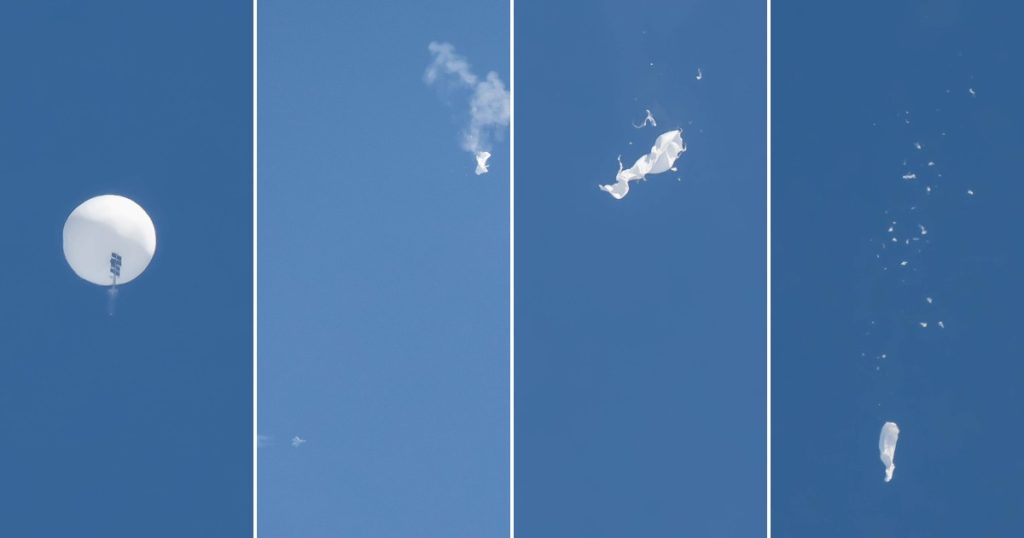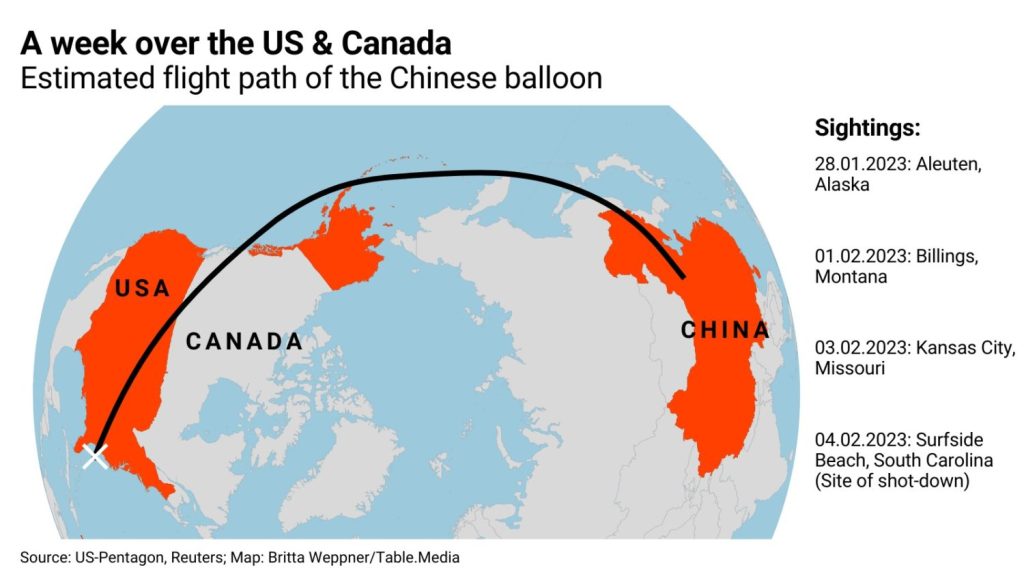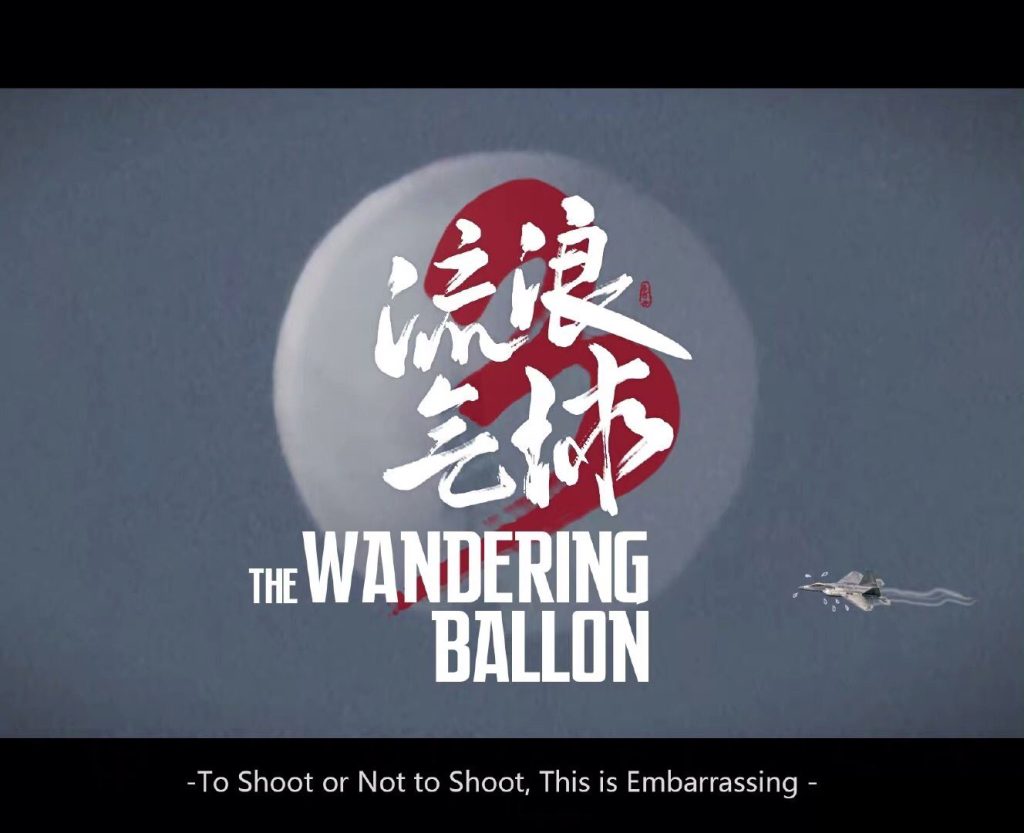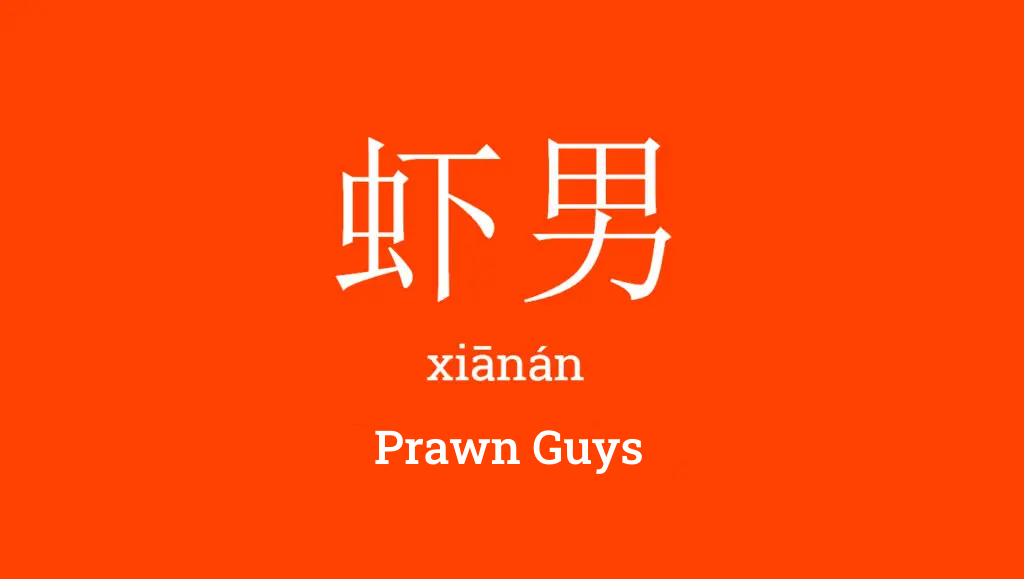The German song “99 Luftballons,” which was an international hit at the height of the Cold War, is also known in China. In the song, flying balloons spark a global war that leaves the world in ruins. The flying object shot down on Saturday, which Beijing claims was merely a stray weather balloon, has also already developed geopolitical explosive power. US Secretary of State Antony Blinken unceremoniously called off his trip to China, which was actually supposed to signal easing tensions between the superpowers.
Beijing is snubbed and accuses Washington of saber-rattling. But what are the real implications of the incident surrounding the alleged spy balloon? Is there just the proverbial hot air after all? Or has it sparked a further escalation in the already tense relations between the US and China, similar to the bombing of the Chinese embassy in Belgrade in 1999? Finn Mayer-Kuckuk analyzes the incident and answers the most pressing questions.
The astray balloon is also the focus of much attention in China’s online community. Many ironically compare the white flying object with the Earth that was catapulted out of orbit in the blockbuster “The Wandering Earth 2,” which is currently turning out to be one of the most successful movies of all time in China. Others accuse the United States of harassment in a deliberate attempt to damage relations between the two countries. Meanwhile, the state media are still holding back. Perhaps Beijing senses that it would have to present its own population with far quicker and harsher measures should a US balloon ever enter Chinese territory. Keeping quiet seems to be the order of the day at the moment. Propaganda can always blow the incident up later.


The US Air Force may have shot down the Chinese observation balloon that has preoccupied the public in recent days. But the incident will define the relationship between the two superpowers for the foreseeable future. The fact that US Secretary of State Antony Blinken has canceled a planned visit to China for the time being does not bode well for the development of dialogue between the two states in the short term.
After all, personal exchanges had only just resumed after the Covid reopening. For now, both sides are exchanging blows, each accusing the other of lying. However, there is also agreement on some points:
But opinions differ on the balloon’s mission.
The US version seems a bit more believable at this time. Air currents at high altitudes are predictable to a certain degree. Anyone who positions a balloon there has at least a rough idea of where it will go. The US continental territory is a huge target. Anything drifting roughly in that direction will also fly over the United States. Moreover, the use of airships for espionage does have its uses in the satellite age and is also planned by the US.

The fuss over the balloon now shows one thing above all: Communication between the two superpowers is completely disrupted. The balloon incident is just one symptom of the currently rather poor relations. The risk of misunderstandings is therefore greater than ever. The communication channels are slim, while the readiness to provoke and respond to provocations is high.
At the very least, Blinken has only postponed his trip until the situation is clarified and promises to maintain the dialogue. At the moment, there is also no sign of further escalation. “The US and China are likely to remain on a course of rapprochement,” believes political scientist Zhao Tong of the Carnegie Endowment for International Peace, a think tank in Washington.
China also sounds comparatively quiet. The tone of official statements on Sunday was downright restrained. The Foreign Ministry merely expressed “strong dissatisfaction and protest” over the downing of the object. Beijing’s holy wrath sounds different. Added to that was an admission of error as early as Friday.
However, there was no apology for the alleged mistake. This would probably have given US President Joe Biden too many diplomatic plus points. Currently, Biden has the moral high ground anyway: It was, after all, a Chinese object that violated US airspace. Whether it was intentional or unintentional hardly matters – the US had all the right to shoot it down.
However, many mysteries and questions remain. If the Chinese version is true, then why has the government not notified the US in time that one of its balloons is on its way to Montana? After all, it is not every day that a device the size of three buses is lost. The balloon was powered by solar cells and was presumably able to report its position throughout the journey. Otherwise, it would be of little use as a weather balloon.
But the behavior of the United States also raises questions. According to the Pentagon, three of these balloons have drifted over US territory in recent years. Why is the Biden administration blowing this out of proportion, while Donald Trump’s administration seems to have maintained a polite silence?
Questions are being raised on both sides in parallel about how deliberate the intent was that led to the current situation. The US Secretary of State was due to travel to Beijing on Sunday. Did China wish to show off its power by taking a particularly brazen action during the visit? If so, it failed predictably. For Blinken, pictures of shaking hands in Beijing would have been unacceptable. The opposing Republicans had already loudly accused the president of being weak for not having the balloon brought down sooner.
Conversely, did the US deliberately overreact to a harmless weather balloon to make China look bad? That is how China’s state media put it. They claim that only Blinken’s cancellation of his trip harmed diplomatic relations. Moreover, Western media are to blame for having “exaggerated” the matter.
In fact, it could very well have been a chain of unfortunate circumstances. A spy balloon: yes. But it may well be that the foreign military reconnaissance, which would be responsible for such a mission, was not aware of the ill-timing of this mission just before Blinken’s visit. In a large bureaucracy, the left hand sometimes does not know what the right hand is doing. The very fact that such fly-overs have already happened several times without provoking a major reaction might have left those in charge of the balloon program careless.
The question of whether this was intentional or accidental leads to a comparison with the bombing of the Chinese embassy in Belgrade in 1999. NATO intervened in the Kosovo war at that time with attacks against Serbia. US bombs hit the building, killing three Chinese journalists. The incident weighed much heavier than the current events surrounding the balloon. The USA claimed that they had used bad cards, while China accused them of intent.
Relations ultimately also recovered from this crisis, just as they did from the Hainan incident in 2001 when a US spy plane collided with a Chinese fighter jet. The jet pilot was killed, and the reconnaissance plane had to make an emergency landing on Hainan and was dismantled by China.
At that time, Washington and Beijing were at first unyielding, but were then willing to strike a conciliatory tone and were eventually able to repair the relationship. This will probably also happen this time, once the initial uproar has subsided. “Both sides have a great interest in stabilizing relations,” believes political scientist Zhao.

In China’s state media, the appearance and shooting down of an alleged Chinese spy balloon over the USA is still kept under wraps so far. The usual outrage-fuelled editorials have yet to appear. However, the basic tone of the State Department’s official statement is already reflected in the news-style reports: the flying object was a civilian weather balloon. The reaction of the USA was as exaggerated as “shooting the mosquito with the cannon”, a Chinese military expert is quoted. Nevertheless, similar steps will now be reserved for “similar situations”, the statement continues. So far, so predictable.
On social media, however, views on the incident continue to vary. Many Chinese associate the meandering balloon, which stirred up geopolitical affairs out of the blue, with the Chinese science fiction box office hit “The Wandering Earth 2” (流浪地球2). The movie is based on a short story by Cixin Liu, in which the earth is purposefully catapulted out of orbit in order to escape an inflating sun.
The film title, in a slightly altered form, has already become a kind of standard term for the astray flying object: 流浪气球, “The Wandering Balloon“. The popular Beijing radio DJ Zhang Youdai came up with a different association. On his WeChat account on Saturday, he posted the German 80s hit “99 Luftballons” by Nena, which is about a swarm of balloons triggering an apocalyptic military strike.
Other users joke that it was simply a sky lantern that went off course. On Sunday, the Chinese celebrated the Lantern Festival, during which floating lanterns, known as Kong Ming lanterns, are traditionally released into the sky across the country. Many users also poke fun at what they see as a paranoid reaction of the US: “The moon was built by the Chinese to monitor the Earth,” mocks one user on Douyin, China’s TikTok. Another writes ironically about the shootdown by the US military: “I hope the data made it back in time.” Another comment points out that everyone knows that smart Chinese refrigerators have long been the most sophisticated spying tools.

But, as expected, there is also a lot of outrage, exacerbating the tenor from the state media. Before the balloon was shot down, the Pentagon failed to provide conclusive evidence that it was indeed an espionage device. China is always immediately treated as “problematic” and accused of espionage, whereas it is the USA that ruthlessly spies on other nations worldwide, a well-known secret, writes one Weibo user.
“We must be careful that the US does not use this as an excuse to cause problems,” wrote one user on the video platform Bilibili. After all, the Canadians, over whose territory the balloon flew, did not make such a fuss, the comment said. Antony Blinken, who canceled his China visit because of the balloon, is no longer welcome, users write on Weibo. “We should send more unmanned airships in the future so that Americans get used to it.” A few see the US in the right. “Data about the weather is important for military strategies,” one user on Bilibili argues.
Despite the debate about dependencies on China, Bosch wants to drive its business in its largest foreign market even more strongly. The strategy is not to reduce its presence in China but to grow in other markets as well, Bosch CEO Stefan Hartung said on the occasion of the publication of preliminary annual figures on Friday.
While the economies in Europe and the US will weaken significantly due to central banks raising interest rates to fight inflation, Bosch expects a strong recovery in China following the end of the Zero-Covid policy and a slowdown in Covid infections.
Last year, Bosch generated around one-fifth of its sales of €88.4 billion in the People’s Republic. Global sales thus grew by twelve percent. A few weeks ago, the company announced it would invest around €950 million in a development center in Suzhou, China, over the next ten years. In China, Bosch produces 80 percent of its products for the local market, Hartung emphasized. “We are not so dependent on that market that we need production to serve the rest of the world.” rtr
Taiwanese Apple supplier Foxconn posted a significant increase in sales in January. The group announced on Sunday that sales rose compared to the same month last year by about 48 percent to a record high of TWD 660.4 billion (€20.42 billion). Compared to December, sales increased by 4.93 percent.
The manufacturer of electronic components benefited from the return to normal production after the end of the Zero-Covid policy in China. Strict measures to combat the Covid virus have repeatedly led to production stoppages at the Zhengzhou factory. Foxconn said sales for January were slightly above market expectations. For the first quarter, analysts expect a four percent year-on-year increase in sales, according to Refinitiv. rtr
Cross-border travel between mainland China, Hong Kong, and Macau is now completely open again. Group travel between China and the two special administrative regions of Hong Kong and Macau will resume, and the number of open customs checkpoints will return to pre-pandemic levels, China’s Hong Kong and Macau Affairs Bureau says on its website. Travelers to Hong Kong will also not have to prove negative Covid tests or Covid vaccination in the future.
On Thursday, the Chinese Special Administrative Region also unveiled its “Hello, Hong Kong” campaign to attract more visitors. Included are also 500,000 free airline tickets for interested visitors from all over the world, which will be given out by local carriers Cathay Pacific, HK Express, and Hong Kong Airlines starting in March.
The tourism industry and also businesses in Hong Kong and Macau have suffered massively from travel restrictions in the wake of the pandemic. Last year, only 600,000 people visited Hong Kong – less than one percent of the number registered in 2018.
But the star of the financial metropolis, once considered cosmopolitan, had already begun to fall after the Chinese leadership put down the democracy movement with the National Security Law for Hong Kong and greatly expanded police control in 2020. As a result, 130 international companies closed their Hong Kong branches in the past three years. According to official figures, more than 140,000 working people have left Hong Kong. flee/rtr

“I have spent a very significant part of my professional life making people aware of this repeatedly: You can’t think of the world without China,” says Susanne Weigelin-Schwiedrzik. Since the mid-1970s, the now 68-year-old has been intensively involved with China. The influence of her older brother – a Mao enthusiast – and a year abroad in the US, where China was already much more prominent in the press than here, awakened her interest in the distant country. So, after graduating from high school in 1973, she took up Sinology, Japanese studies, and political science studies in Bonn – the beginning of a lifelong passion.
Susanne Weigelin-Schwiedrzik was one of the first to travel to China through the DAAD in 1975. A country that, according to her, was still as far away as the moon for most Europeans at the time. With Johnny Erling, Harro von Senger, and David Zweig, she devoted herself to “Marxism, Leninism, and Mao Zedong ideas” at the Faculty of Philosophy in Beijing.
She has a particularly vivid memory of the announcement of the fall of the so-called Gang of Four: “On that day, we foreign students were not allowed to be present at all because they didn’t know if the students at Peking University would somehow react with protests or something similar.” So they were sent to work in the rice fields that day, an activity that was considered part of their studies, along with other physical exercises. When they returned, the campus atmosphere was different: “We thought we couldn’t believe our eyes because the whole campus was dancing. We heard Chopin music over the loudspeakers, and my Chinese roommate and friend came and hugged me.”
Modern China, where she was able to witness live important political milestones such as the end of the Cultural Revolution, formed the focus of her university research: “I claim for myself that I am one of the first in Germany who decided to deal explicitly only with modern China in Sinology.” Accordingly, she earned her doctorate and habilitation in this field and later passed on her knowledge to students as a Professor at Heidelberg University.
As a central theme, she focused on the question, “How do you make Chinese history in China? And how does China deal with history?” throughout her academic career. The view through international glasses, in particular, enabled her to make a differentiated analysis: “The combination that I, as a European, have relations to both China and America has been very important for my entire further development as a China scholar.”
In the last years of her working life, Susanne Weigelin-Schwiedrzik taught at the University of Vienna. She retired in October 2020 but continues contributing her expertise to current discussions on China. Her second academic focus also comes into play here: political science. One of the topics she was interviewed on particularly last year: the Ukraine war. Since February 2022, she has been trying to explain to the world that there has never been a clear position from the Chinese side.
And she clears up another China misinterpretation: “For 20 years, I’ve been trying to explain to people that there are different opinions within the Communist Party and that this party is not a monolithic party.” The whole dynamic of the political system, she said, can be derived from the fact “that this party represents a wide variety of regional, generational, and political-economic interests and usually has them in its leadership.” She said the notion of the party as a unity was never correct. “That Xi has now pushed all alternative voices out of the leadership bodies and still has to try to accommodate all the different interests is not a sign of his strength, but a sign of his weakness.”
Her decades of involvement with the country and the expertise she has gained as a result make her a luminary of Sinology. Her view is nuanced, her insight never one-dimensional but grounded by a deep understanding of history and politics. “I know that I am someone who is difficult to assign clearly because I don’t belong to the people who are always bashing China. But I’m also not one of those people who overlook all the things the Chinese do that are terrible.” Juliane Scholuebbers
Robert Neuhauser has been a Project Manager at Paragon Automotive China since January. The company, based in Delbrück in North Rhine-Westphalia, supplies the automotive industry with electronic parts and sensors. For his new post, Neuhauser has moved from Landsberg am Lech to Kunshan in Jiangsu Province.
Jian Zhi is the new Senior Project Buyer at Hansgrohe China. The fittings manufacturer from Schiltach in the Black Forest has been active in China since 1996. Jian Zhi will oversee strategic, operational project purchasing for the Shanghai office.
Is something changing in your organization? Why not let us know at heads@table.media!

You know prawn crackers. But have you ever heard of prawn guys, the newest word creation floating in Chinese net slang? No? No problem. Conveniently, even laymen can easily identify shrimp guys at the first glance. A little rule of thumb: body top, face flop? Bingo! Then you have a shrimp guy on the hook. Because China’s Internet community has recently begun calling men with a well-toned body and average face 虾男 xiānán – literally shrimp man or shrimp guy. To be fair, there is of course also the female counterpart – the prawn girl (虾女 xiānǚ).
Where did the seafood metaphor come from? Well, just imagine a juicy premium prawn that you delicately peel out of its crispy shell. The firm flesh curls between your fingertips like a crisp six-pack. But wait, before you take a bite, what has to go? That’s right, the head. It is inedible. Et voilà – the idea of shrimp-hunk and shrimp-beauty is born.
Another type of shellfish scuttles through Chinese gibberish – namely the “crab” or “crab-woman” (蟹女 xiènǚ). This species is characterized by its shimmering but hard shell, coupled with a pinch of sharp ferocity. We are talking about women with harsh outgoing personalities, who don’t take no for an answer and – similar to the armored crab, which always has its claws out and is ready to attack.
But anyone who has ever cooked and cracked a crab knows that, unlike juicy shrimps, you only end up with a meager yield of slimy meat from the shell and claws – in other words: A shimmering shell with nothing to back it up. And this, in the eyes of Chinese linguistic acrobats, is precisely the distinguishing feature of “crab women”. They loudly draw attention to themselves, but when it comes down to it, it turns out that there is not much substance behind their big words.
And what seafood mix can you find in your social circle? Unfortunately, there are no definitions yet for sea cucumber ladies and mutton men, mussel maidens or squid blokes. But you are welcome to get creative. Maybe one or two new marine phrases will make it into our daily vocabulary, be it in English or Chinese.
Verena Menzel runs the online language school New Chinese in Beijing.
The German song “99 Luftballons,” which was an international hit at the height of the Cold War, is also known in China. In the song, flying balloons spark a global war that leaves the world in ruins. The flying object shot down on Saturday, which Beijing claims was merely a stray weather balloon, has also already developed geopolitical explosive power. US Secretary of State Antony Blinken unceremoniously called off his trip to China, which was actually supposed to signal easing tensions between the superpowers.
Beijing is snubbed and accuses Washington of saber-rattling. But what are the real implications of the incident surrounding the alleged spy balloon? Is there just the proverbial hot air after all? Or has it sparked a further escalation in the already tense relations between the US and China, similar to the bombing of the Chinese embassy in Belgrade in 1999? Finn Mayer-Kuckuk analyzes the incident and answers the most pressing questions.
The astray balloon is also the focus of much attention in China’s online community. Many ironically compare the white flying object with the Earth that was catapulted out of orbit in the blockbuster “The Wandering Earth 2,” which is currently turning out to be one of the most successful movies of all time in China. Others accuse the United States of harassment in a deliberate attempt to damage relations between the two countries. Meanwhile, the state media are still holding back. Perhaps Beijing senses that it would have to present its own population with far quicker and harsher measures should a US balloon ever enter Chinese territory. Keeping quiet seems to be the order of the day at the moment. Propaganda can always blow the incident up later.


The US Air Force may have shot down the Chinese observation balloon that has preoccupied the public in recent days. But the incident will define the relationship between the two superpowers for the foreseeable future. The fact that US Secretary of State Antony Blinken has canceled a planned visit to China for the time being does not bode well for the development of dialogue between the two states in the short term.
After all, personal exchanges had only just resumed after the Covid reopening. For now, both sides are exchanging blows, each accusing the other of lying. However, there is also agreement on some points:
But opinions differ on the balloon’s mission.
The US version seems a bit more believable at this time. Air currents at high altitudes are predictable to a certain degree. Anyone who positions a balloon there has at least a rough idea of where it will go. The US continental territory is a huge target. Anything drifting roughly in that direction will also fly over the United States. Moreover, the use of airships for espionage does have its uses in the satellite age and is also planned by the US.

The fuss over the balloon now shows one thing above all: Communication between the two superpowers is completely disrupted. The balloon incident is just one symptom of the currently rather poor relations. The risk of misunderstandings is therefore greater than ever. The communication channels are slim, while the readiness to provoke and respond to provocations is high.
At the very least, Blinken has only postponed his trip until the situation is clarified and promises to maintain the dialogue. At the moment, there is also no sign of further escalation. “The US and China are likely to remain on a course of rapprochement,” believes political scientist Zhao Tong of the Carnegie Endowment for International Peace, a think tank in Washington.
China also sounds comparatively quiet. The tone of official statements on Sunday was downright restrained. The Foreign Ministry merely expressed “strong dissatisfaction and protest” over the downing of the object. Beijing’s holy wrath sounds different. Added to that was an admission of error as early as Friday.
However, there was no apology for the alleged mistake. This would probably have given US President Joe Biden too many diplomatic plus points. Currently, Biden has the moral high ground anyway: It was, after all, a Chinese object that violated US airspace. Whether it was intentional or unintentional hardly matters – the US had all the right to shoot it down.
However, many mysteries and questions remain. If the Chinese version is true, then why has the government not notified the US in time that one of its balloons is on its way to Montana? After all, it is not every day that a device the size of three buses is lost. The balloon was powered by solar cells and was presumably able to report its position throughout the journey. Otherwise, it would be of little use as a weather balloon.
But the behavior of the United States also raises questions. According to the Pentagon, three of these balloons have drifted over US territory in recent years. Why is the Biden administration blowing this out of proportion, while Donald Trump’s administration seems to have maintained a polite silence?
Questions are being raised on both sides in parallel about how deliberate the intent was that led to the current situation. The US Secretary of State was due to travel to Beijing on Sunday. Did China wish to show off its power by taking a particularly brazen action during the visit? If so, it failed predictably. For Blinken, pictures of shaking hands in Beijing would have been unacceptable. The opposing Republicans had already loudly accused the president of being weak for not having the balloon brought down sooner.
Conversely, did the US deliberately overreact to a harmless weather balloon to make China look bad? That is how China’s state media put it. They claim that only Blinken’s cancellation of his trip harmed diplomatic relations. Moreover, Western media are to blame for having “exaggerated” the matter.
In fact, it could very well have been a chain of unfortunate circumstances. A spy balloon: yes. But it may well be that the foreign military reconnaissance, which would be responsible for such a mission, was not aware of the ill-timing of this mission just before Blinken’s visit. In a large bureaucracy, the left hand sometimes does not know what the right hand is doing. The very fact that such fly-overs have already happened several times without provoking a major reaction might have left those in charge of the balloon program careless.
The question of whether this was intentional or accidental leads to a comparison with the bombing of the Chinese embassy in Belgrade in 1999. NATO intervened in the Kosovo war at that time with attacks against Serbia. US bombs hit the building, killing three Chinese journalists. The incident weighed much heavier than the current events surrounding the balloon. The USA claimed that they had used bad cards, while China accused them of intent.
Relations ultimately also recovered from this crisis, just as they did from the Hainan incident in 2001 when a US spy plane collided with a Chinese fighter jet. The jet pilot was killed, and the reconnaissance plane had to make an emergency landing on Hainan and was dismantled by China.
At that time, Washington and Beijing were at first unyielding, but were then willing to strike a conciliatory tone and were eventually able to repair the relationship. This will probably also happen this time, once the initial uproar has subsided. “Both sides have a great interest in stabilizing relations,” believes political scientist Zhao.

In China’s state media, the appearance and shooting down of an alleged Chinese spy balloon over the USA is still kept under wraps so far. The usual outrage-fuelled editorials have yet to appear. However, the basic tone of the State Department’s official statement is already reflected in the news-style reports: the flying object was a civilian weather balloon. The reaction of the USA was as exaggerated as “shooting the mosquito with the cannon”, a Chinese military expert is quoted. Nevertheless, similar steps will now be reserved for “similar situations”, the statement continues. So far, so predictable.
On social media, however, views on the incident continue to vary. Many Chinese associate the meandering balloon, which stirred up geopolitical affairs out of the blue, with the Chinese science fiction box office hit “The Wandering Earth 2” (流浪地球2). The movie is based on a short story by Cixin Liu, in which the earth is purposefully catapulted out of orbit in order to escape an inflating sun.
The film title, in a slightly altered form, has already become a kind of standard term for the astray flying object: 流浪气球, “The Wandering Balloon“. The popular Beijing radio DJ Zhang Youdai came up with a different association. On his WeChat account on Saturday, he posted the German 80s hit “99 Luftballons” by Nena, which is about a swarm of balloons triggering an apocalyptic military strike.
Other users joke that it was simply a sky lantern that went off course. On Sunday, the Chinese celebrated the Lantern Festival, during which floating lanterns, known as Kong Ming lanterns, are traditionally released into the sky across the country. Many users also poke fun at what they see as a paranoid reaction of the US: “The moon was built by the Chinese to monitor the Earth,” mocks one user on Douyin, China’s TikTok. Another writes ironically about the shootdown by the US military: “I hope the data made it back in time.” Another comment points out that everyone knows that smart Chinese refrigerators have long been the most sophisticated spying tools.

But, as expected, there is also a lot of outrage, exacerbating the tenor from the state media. Before the balloon was shot down, the Pentagon failed to provide conclusive evidence that it was indeed an espionage device. China is always immediately treated as “problematic” and accused of espionage, whereas it is the USA that ruthlessly spies on other nations worldwide, a well-known secret, writes one Weibo user.
“We must be careful that the US does not use this as an excuse to cause problems,” wrote one user on the video platform Bilibili. After all, the Canadians, over whose territory the balloon flew, did not make such a fuss, the comment said. Antony Blinken, who canceled his China visit because of the balloon, is no longer welcome, users write on Weibo. “We should send more unmanned airships in the future so that Americans get used to it.” A few see the US in the right. “Data about the weather is important for military strategies,” one user on Bilibili argues.
Despite the debate about dependencies on China, Bosch wants to drive its business in its largest foreign market even more strongly. The strategy is not to reduce its presence in China but to grow in other markets as well, Bosch CEO Stefan Hartung said on the occasion of the publication of preliminary annual figures on Friday.
While the economies in Europe and the US will weaken significantly due to central banks raising interest rates to fight inflation, Bosch expects a strong recovery in China following the end of the Zero-Covid policy and a slowdown in Covid infections.
Last year, Bosch generated around one-fifth of its sales of €88.4 billion in the People’s Republic. Global sales thus grew by twelve percent. A few weeks ago, the company announced it would invest around €950 million in a development center in Suzhou, China, over the next ten years. In China, Bosch produces 80 percent of its products for the local market, Hartung emphasized. “We are not so dependent on that market that we need production to serve the rest of the world.” rtr
Taiwanese Apple supplier Foxconn posted a significant increase in sales in January. The group announced on Sunday that sales rose compared to the same month last year by about 48 percent to a record high of TWD 660.4 billion (€20.42 billion). Compared to December, sales increased by 4.93 percent.
The manufacturer of electronic components benefited from the return to normal production after the end of the Zero-Covid policy in China. Strict measures to combat the Covid virus have repeatedly led to production stoppages at the Zhengzhou factory. Foxconn said sales for January were slightly above market expectations. For the first quarter, analysts expect a four percent year-on-year increase in sales, according to Refinitiv. rtr
Cross-border travel between mainland China, Hong Kong, and Macau is now completely open again. Group travel between China and the two special administrative regions of Hong Kong and Macau will resume, and the number of open customs checkpoints will return to pre-pandemic levels, China’s Hong Kong and Macau Affairs Bureau says on its website. Travelers to Hong Kong will also not have to prove negative Covid tests or Covid vaccination in the future.
On Thursday, the Chinese Special Administrative Region also unveiled its “Hello, Hong Kong” campaign to attract more visitors. Included are also 500,000 free airline tickets for interested visitors from all over the world, which will be given out by local carriers Cathay Pacific, HK Express, and Hong Kong Airlines starting in March.
The tourism industry and also businesses in Hong Kong and Macau have suffered massively from travel restrictions in the wake of the pandemic. Last year, only 600,000 people visited Hong Kong – less than one percent of the number registered in 2018.
But the star of the financial metropolis, once considered cosmopolitan, had already begun to fall after the Chinese leadership put down the democracy movement with the National Security Law for Hong Kong and greatly expanded police control in 2020. As a result, 130 international companies closed their Hong Kong branches in the past three years. According to official figures, more than 140,000 working people have left Hong Kong. flee/rtr

“I have spent a very significant part of my professional life making people aware of this repeatedly: You can’t think of the world without China,” says Susanne Weigelin-Schwiedrzik. Since the mid-1970s, the now 68-year-old has been intensively involved with China. The influence of her older brother – a Mao enthusiast – and a year abroad in the US, where China was already much more prominent in the press than here, awakened her interest in the distant country. So, after graduating from high school in 1973, she took up Sinology, Japanese studies, and political science studies in Bonn – the beginning of a lifelong passion.
Susanne Weigelin-Schwiedrzik was one of the first to travel to China through the DAAD in 1975. A country that, according to her, was still as far away as the moon for most Europeans at the time. With Johnny Erling, Harro von Senger, and David Zweig, she devoted herself to “Marxism, Leninism, and Mao Zedong ideas” at the Faculty of Philosophy in Beijing.
She has a particularly vivid memory of the announcement of the fall of the so-called Gang of Four: “On that day, we foreign students were not allowed to be present at all because they didn’t know if the students at Peking University would somehow react with protests or something similar.” So they were sent to work in the rice fields that day, an activity that was considered part of their studies, along with other physical exercises. When they returned, the campus atmosphere was different: “We thought we couldn’t believe our eyes because the whole campus was dancing. We heard Chopin music over the loudspeakers, and my Chinese roommate and friend came and hugged me.”
Modern China, where she was able to witness live important political milestones such as the end of the Cultural Revolution, formed the focus of her university research: “I claim for myself that I am one of the first in Germany who decided to deal explicitly only with modern China in Sinology.” Accordingly, she earned her doctorate and habilitation in this field and later passed on her knowledge to students as a Professor at Heidelberg University.
As a central theme, she focused on the question, “How do you make Chinese history in China? And how does China deal with history?” throughout her academic career. The view through international glasses, in particular, enabled her to make a differentiated analysis: “The combination that I, as a European, have relations to both China and America has been very important for my entire further development as a China scholar.”
In the last years of her working life, Susanne Weigelin-Schwiedrzik taught at the University of Vienna. She retired in October 2020 but continues contributing her expertise to current discussions on China. Her second academic focus also comes into play here: political science. One of the topics she was interviewed on particularly last year: the Ukraine war. Since February 2022, she has been trying to explain to the world that there has never been a clear position from the Chinese side.
And she clears up another China misinterpretation: “For 20 years, I’ve been trying to explain to people that there are different opinions within the Communist Party and that this party is not a monolithic party.” The whole dynamic of the political system, she said, can be derived from the fact “that this party represents a wide variety of regional, generational, and political-economic interests and usually has them in its leadership.” She said the notion of the party as a unity was never correct. “That Xi has now pushed all alternative voices out of the leadership bodies and still has to try to accommodate all the different interests is not a sign of his strength, but a sign of his weakness.”
Her decades of involvement with the country and the expertise she has gained as a result make her a luminary of Sinology. Her view is nuanced, her insight never one-dimensional but grounded by a deep understanding of history and politics. “I know that I am someone who is difficult to assign clearly because I don’t belong to the people who are always bashing China. But I’m also not one of those people who overlook all the things the Chinese do that are terrible.” Juliane Scholuebbers
Robert Neuhauser has been a Project Manager at Paragon Automotive China since January. The company, based in Delbrück in North Rhine-Westphalia, supplies the automotive industry with electronic parts and sensors. For his new post, Neuhauser has moved from Landsberg am Lech to Kunshan in Jiangsu Province.
Jian Zhi is the new Senior Project Buyer at Hansgrohe China. The fittings manufacturer from Schiltach in the Black Forest has been active in China since 1996. Jian Zhi will oversee strategic, operational project purchasing for the Shanghai office.
Is something changing in your organization? Why not let us know at heads@table.media!

You know prawn crackers. But have you ever heard of prawn guys, the newest word creation floating in Chinese net slang? No? No problem. Conveniently, even laymen can easily identify shrimp guys at the first glance. A little rule of thumb: body top, face flop? Bingo! Then you have a shrimp guy on the hook. Because China’s Internet community has recently begun calling men with a well-toned body and average face 虾男 xiānán – literally shrimp man or shrimp guy. To be fair, there is of course also the female counterpart – the prawn girl (虾女 xiānǚ).
Where did the seafood metaphor come from? Well, just imagine a juicy premium prawn that you delicately peel out of its crispy shell. The firm flesh curls between your fingertips like a crisp six-pack. But wait, before you take a bite, what has to go? That’s right, the head. It is inedible. Et voilà – the idea of shrimp-hunk and shrimp-beauty is born.
Another type of shellfish scuttles through Chinese gibberish – namely the “crab” or “crab-woman” (蟹女 xiènǚ). This species is characterized by its shimmering but hard shell, coupled with a pinch of sharp ferocity. We are talking about women with harsh outgoing personalities, who don’t take no for an answer and – similar to the armored crab, which always has its claws out and is ready to attack.
But anyone who has ever cooked and cracked a crab knows that, unlike juicy shrimps, you only end up with a meager yield of slimy meat from the shell and claws – in other words: A shimmering shell with nothing to back it up. And this, in the eyes of Chinese linguistic acrobats, is precisely the distinguishing feature of “crab women”. They loudly draw attention to themselves, but when it comes down to it, it turns out that there is not much substance behind their big words.
And what seafood mix can you find in your social circle? Unfortunately, there are no definitions yet for sea cucumber ladies and mutton men, mussel maidens or squid blokes. But you are welcome to get creative. Maybe one or two new marine phrases will make it into our daily vocabulary, be it in English or Chinese.
Verena Menzel runs the online language school New Chinese in Beijing.
